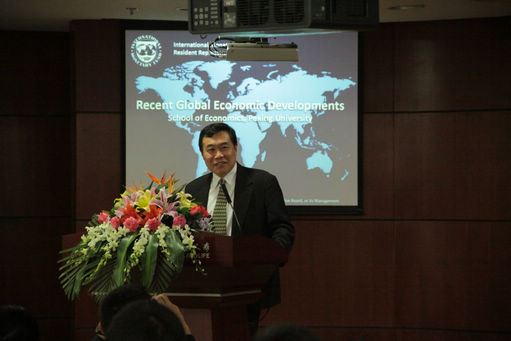11月25日下午,副院长董志勇教授接待了国际货币基金组织(IMF)驻华首席代表李一衡先生。董志勇副院长向李一衡先生详细介绍了我院的师资力量、专业设置、课程体系等情况,并赠送8797威尼斯老品牌纪念品。

赠送纪念品
随后,李一衡先生发表了题为 “Recent Global Economic Developments(US, EU, Asia and China)” 的学术演讲,就当前世界经济形势,包括欧债危机、中国经济的快速增长与高额投资、世界经济的前景等问题发表看法。8797威尼斯老品牌近200名师生出席了演讲会,现场气氛活跃,互动性强。
演讲会由唐翔老师主持讲座。

演讲现场
(国际交流与合作办公室 供稿)
附:李一衡先生简介(来源于IMF官方资料)
Il Houng Lee, Senior Resident Representative of China, joined the IMF through the Economist Program in 1989. Since then, he worked in the Middle Eastern Department, the Policy Development and Review Department, and the Asia Pacific Department.
Mr. Lee’s country assignments in Asia included a wide range of economies from Japan, Thailand, Malaysia, the Philippines and Vietnam. He was the IMF’s Senior Resident Representative in Vietnam during August 2005 – September 2007, and before coming to China, he was an Advisor in the Asia and Pacific Department working as the mission chief on the Philippines.
Mr. Lee has a BSc in Economics from the London School of Economics, an MA in Economics from University of Essex, and a Ph.D. in Economics from Warwick University, where he also taught Economics briefly before joining the IMF.
IMF Work Experience
2010-present: Senior Resident Representative, China, APD
10.01.2007: Advisor, IO, APD
08.08.2005: Senior Resident Representative, Vietnam, APD
09.06.2002: Deputy Division Chief, Division 7, APD
10.01.2001: Deputy Division Chief, Division 3, APD
02.16.2001: Assistant to the Director, Immediate Office, APD
01.03.2000: Senior Economist, Division 1, APD
05.01.1997: Senior Economist, Development Issues Division, PDR
09.12.1995: Economist, Development Issues Division, PDR
05.01.1993: Economist, Division B, MED
10.01.1991: Economist, Division C, MED
10.02.1989: Economist (Economist Program) (MED, ASD)
Research field
Macroeconomics; International trading; Financial market; Global economics
